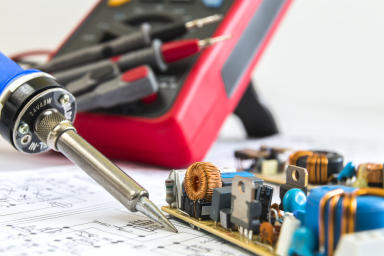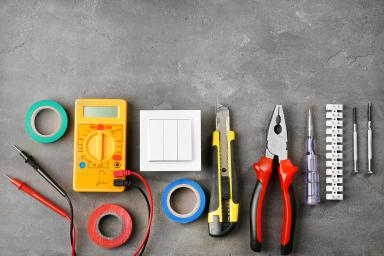How To Hire A Handyman

Waking up for an early morning shower only to find that the water heater is not working is probably the worst way to start the day. Then, just when you think your bad luck can’t get any worse, you discover that the toilet is overflowing and the faucet is leaking. None of these can make you skip breakfast, but on your way to the kitchen, you notice that the walls need a new paint job and the driveway could use a power wash.
These are all telltale signs that you need a handyman. Also called a maintenance or repair technician, a handyman is an expert at fixing common household problems like broken faucets. They also do construction work, such as remodeling. But for a first-time homeowner or someone who has never dealt with home maintenance issues before, hiring a handyman may be daunting.
There are many questions to ask, like what their qualifications are, what services they offer, and how much they charge customers. This article answers these common questions and offers a few tips on how to find a handyman who can help you with your home repair troubles.
Do You Need to Hire a Handyman?
Hiring a handyman isn’t cheap, so make sure you absolutely need one before making the call. Not every job out there will require the services of a handyman. If you’re a reasonably skilled individual who’s good in shop class, you should be able to perform basic woodwork or tighten a few nuts to close a leaking pipe.
But there are jobs that require a greater amount of care and attention than regular people can provide. Unless you yourself have the training to handle a repair job, it’s always better to go with a professional. Here are a few other things you should consider when deciding whether to do the work yourself or let a handyman take care of it.
Do you have the time to do the job?
You may know how to use a toolbox and perform basic maintenance work, but it’s also possible that you’re too busy with your day job to do so. A repair or remodeling project could take a long time to complete, so leaving the task to the pros might be a better option.
Can you really save money?
Doing things on your own saves you money on labor. With DIY solutions, homeowners can cut repair costs by up to 50%. However, the chance of making a mistake is high. You’ll need a do-over, which means the labor savings could vanish completely. If you’re not confident enough that there will be no major mistakes, get a specialist. Safety is an issue, and you don’t want property damage or physical injury to give you more problems.
What’s more, a botched job could lower the value of your house, which would make resale more difficult. If you plan on monetizing the property any time soon, it will be preferable to lower the risks and hire a good handyman.
Do you have the necessary tools?
Having skills is one thing, but owning the right tools for the job is another. It might be easy to buy hammers and screwdrivers from nearby hardware stores, but experts know where to look for more specialized items, such as precision tools.
What Are the Steps to Hiring a Handyman?
1. Know the scope of the project
Find out exactly what you need and set the appropriate expectations. If your home repair needs are relatively minor, like painting a wall or garage door, a handyman will be ideal for the job. You may also get a handyman for remodeling work, but it’s best to stay below the limits of what will require a building permit. For those jobs, it might be better to hire a general contractor. Also, better leave major overhauls and electrical work to knowledgeable specialists with more intensive training and experience in those fields.
2. Find at least three potential candidates
Search engines are a wonderful resource for scoping out potential handymen and handyman companies near your area. To filter out unwanted candidates, it could be worthwhile to check professional listings and online directories.
Interviewing any potential handymen is good practice, and industry experts advise going with at least three. You can even go beyond the minimum to cast the widest net possible. If the well-being of one’s house is at stake, there’s no need to be stingy with the time it takes to do interviews.
3. Evaluate the candidates and look for red flags
When interviewing a handyman, be on the lookout for any parties who want payment upfront. This is against standard industry practice. It’s better to look for a person who asks for payment after the job is done and who will account for the cost of labor and parts to justify the expenses charged.
Also, be wary of firms or persons who seek out customers by doing house visits or phone calls. It is safer if the initiative comes from you and not from the building handyman. It leaves a bad impression if someone seemingly needs a job so badly that they are willing to present themselves unasked to the homeowner.
4. Create a contract outlining the terms of the project
Everything that is important in life must be memorialized in a written contract, and this truth is no different when trying to safely hire a handyman. A written agreement protects both the customer and the person providing the service.
It lets the handyman know what the job will be, the expected scope, and the specifications set out by the homeowner. The document also tells the homeowner when the project should be completed and what the consequences would be for substandard or delayed work. If there are any guarantees of warranties for poor workmanship, these should be in the contract.
5. Get guarantees
Ask the handyman for warranties or guarantees on the quality of the work to be rendered. Make sure that these commitments are included in the written contract. They will serve as a promise from the worker to perform the project in the best way possible.
6. Inspect the finished work
Once the work is done, it is time to see if the handyman met your expectations. If so, then the project is over, and it’s time to proceed with life as usual. If not, then it is a good opportunity to use the warranties and guarantees that are in the contract.
How Do You Choose a Good Handyman?
Now that you already know how to hire a handyman, the more important question arises: who should you hire? To decide without having to go through a long list of criteria, you may look at the following considerations.
Is the handyman licensed?
Different states have different requirements when it comes to licensing handymen and general contractors. There are states that don’t require any form of licensing. Some states, like California, require a general contractor license if the project is worth more than $500. This threshold changes from jurisdiction to jurisdiction. Some have additional requirements, like general liability and property damage insurance, to pay for any damage or injury during work.
Sometimes, even if there’s no state-level licensing requirement, local laws might impose their own restrictions on the handyman trade, with Maine being one such state that follows this pattern. Further, even if there are no license requirements for small jobs, the government might require registration, like what happens in Massachusetts.
How much experience does the handyman have?
The longer a handyman has been in the fixup or related trade, the better. It is better to get someone who has decades of know-how than someone who has just finished an internet course the previous day and never built a thing their entire life.
When searching online, the easiest way to scrutinize a handyman or firm’s experience is to go to the About page. Those with a lot of experience are always willing to show it off. If they brag more about having nice equipment or gear, maybe there isn't much in the way of experience to talk about, and it might raise some red flags.
Checking out the person’s reputation online is also a wise move. Look for online reviews and see if the prospective building handyman has a good track record for excellence and making people happy. Look at review sites and aggregators, not personal websites, since the latter will usually filter out negative feedback.
Is the handyman’s specialization a good fit for your house’s needs?
The handyman trade is a broad and generalized one. Not every person in the industry will be all-knowing about every task. Some may be skilled in electronics and lighting but less skilled in plumbing. Make sure that their skills fit the jobs you need.
How Much Does It Cost to Hire a Handyman?
The cost of hiring a handyman depends on how complex the job is and the scale of the project. For a small job, rates may run as low as $75 to $150 if the project takes less than two hours, translating to a figure of around $75 per hour. In some places, handymen charge as low as $50 per hour.
The nature of the task also affects the cost of labor. Something as simple as moving paintings around may cost $60 to $125, but actually painting an entire room might run up to $1,000. More experienced people charge more. Some experts charge by the job and not by the hour, so make sure this is clear to you from the outset to avoid unexpected costs.
How Do You Negotiate the Cost When Hiring a Handyman?
A customer has nothing to lose by negotiating with handymen when it comes to the pricing of a project. A handyman will charge either on an hourly basis or on a per-job basis, and it may be cheaper to negotiate one way or another when talking to a building handyman.
If a project will take a long time, it might not be a great idea to pay by the hour. If the task requires little time to finish, a handyman might prefer to be paid by job because they run a business and must recoup travel costs. There’s a lot of room to negotiate, and there’s no harm in doing so in a calm and civil manner.
The cost of safely hiring a handyman is highly variable based on a number of different considerations, so don’t hesitate to negotiate. What is important is to come to a healthy middle ground that leaves the handyman happy with their take at the end of the day and the homeowner satisfied with the results.
Conclusion
Now that you’ve learned about how you can find an extra pair of hands with your home repair and improvement needs, hiring a handyman should no longer be a daunting task. You just need to be equipped with the knowledge to make the right decisions. DIY projects have their charm and place, to be sure, but if you don’t have the time, tools, or experience to do the job, it is best to leave the task to the experts.
Expertise.com StaffAuthor
At Expertise.com, we're passionate about guiding people to find the best in life, whether they're researching how to start a small business, planning a home remodeling project, or discovering a new hobby.




